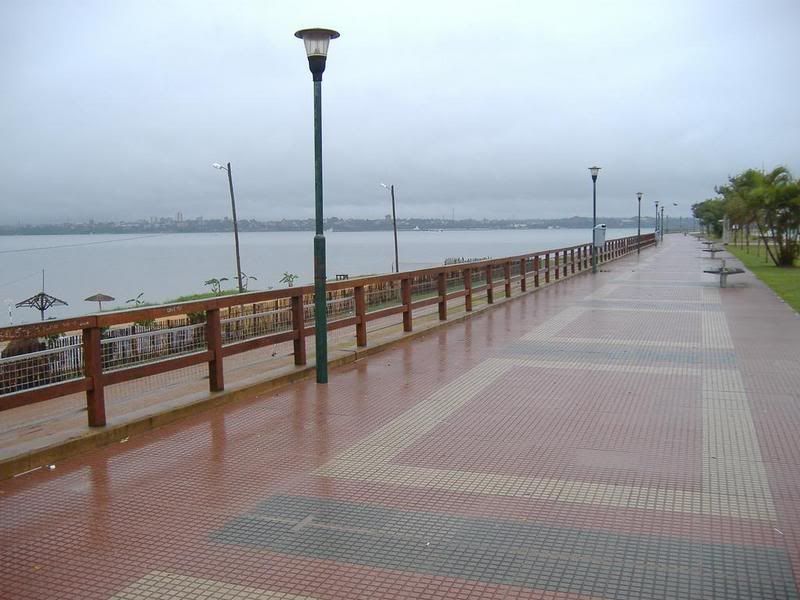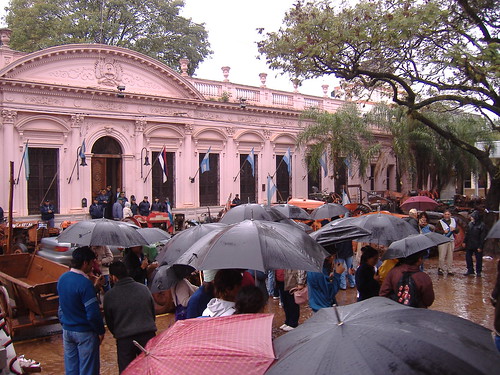 The first surprise of the trip came immediately afterwards, when I took a cab at the bus terminal. I gave the driver the address of the place I'd be staying, and he started driving along really dark neighbourhoods. On and on we went. It turns out that not only is the terminal quite far from the downtown, but also Complejo Aventura (my place) is far away from both. I paid 13 pesos for the taxi ride, which would've been enough to buy me a good lunch. I got to Complejo Aventura, which was a large place with trees and cabins joined by tiled paths, and in the dark, feeling incredibly, horribly, uncomfortably cold (remember this was the day when it snowed in Buenos Aires), I was directed to my cabin. No problem there — except there was no heating, of course.
The first surprise of the trip came immediately afterwards, when I took a cab at the bus terminal. I gave the driver the address of the place I'd be staying, and he started driving along really dark neighbourhoods. On and on we went. It turns out that not only is the terminal quite far from the downtown, but also Complejo Aventura (my place) is far away from both. I paid 13 pesos for the taxi ride, which would've been enough to buy me a good lunch. I got to Complejo Aventura, which was a large place with trees and cabins joined by tiled paths, and in the dark, feeling incredibly, horribly, uncomfortably cold (remember this was the day when it snowed in Buenos Aires), I was directed to my cabin. No problem there — except there was no heating, of course.Long story short, I had to take a bus to get to the center. I'm used to take buses everywhere, but this one took ages to come. The trip itself was short, merely 10 minutes, and left me on one edge of the city center. Posadas is a fairly large, sprawling city; the center is a 14x14 block area in the old Spanish tradition: everything neatly arranged in a regular square grid, with a plaza at the center, with the government house on one side and the church on the other. I walked aimlessly around with my umbrella. The city was not very active, maybe because it was a holiday. As I neared the main square, I heard sounds of roaring engines and singing. I came closer and saw there were many people on foot with their umbrellas, sipping mate or just braving the cold, and a row of tractors and other vehicles aligning in front of the government house. I'd run into a protest!
I read the signs and asked some guy about the demonstration. Misiones is famous for its yerba mate, and produces much (if not most) of the yerba we all put into our mates every day, but the ones who grow it and harvest it are getting mere cents for it. It seems the government and the big yerba companies came to an agreement with the farmers to pay them at least 48 centavos (about 15 cents of a dollar) per kilo of yerba mate leaves, but they're paying less than half of that. The demonstration was colourful, with labour union representatives, popular singers, and the usual assortment of kindergarten-level leftist demands. (PS: I got a video of a woman singing in Guaraní.)
I left. I guess I had something to eat, then I headed for the Costanera. Posadas had a new coastal avenue built and paid for by the Binational Yacyretá Organization, i.e. the Argentine-Paraguayan company that manages the massive Yacyretá dam and hydroelectrical plant. (Yacyretá is the second largest dam in the world and by itself generates most of the energy needs of Paraguay, and a lot for Argentina as well. It's 83 km downstream from Posadas, but the effects of the rising waters extended past there.) Posadas has a lovely long costanera, which must be really a show in the summer... or just when the sun is up.

Some interesting facts about Posadas:
- The city has a waste separation system! I don't know if it actually works, but at least the city is very clean.
- There are exclusive bus lanes in several streets. This is something that was proposed in Rosario and implemented for a while, along Corrientes St., until businesses complained. One step back in the fight against traffic chaos...
- The city, as expected in this land of past geological shifts, has slopes everywhere. You can get moderate exercise just by walking.
- There are many trees, and wild things growing on trees or sprouting from walls. This is the main reminder that Posadas is on a wet subtropical area, even if it's winter and you're shivering.


Welcome back! Eagerly waiting for your posts about the trip :)
ReplyDeleteTomas